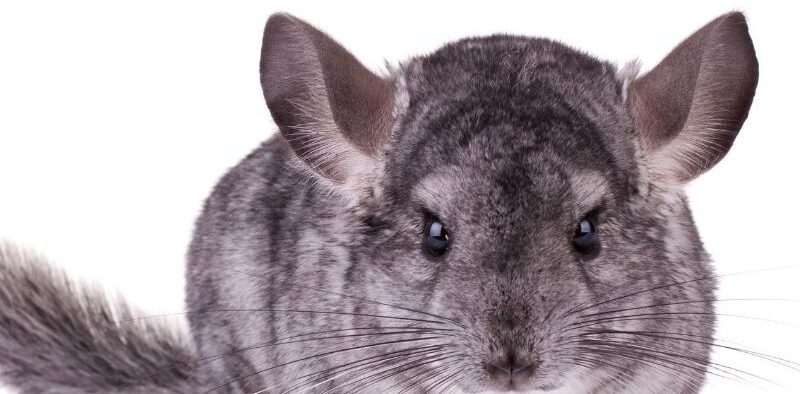Caring for a Chinchilla
Share

Chinchillas, with their impossibly soft fur and gentle personalities, can make captivating companions. But before you bring one of these adorable rodents home, it’s vital to understand their specific needs. They do have a few specific needs when it comes their care. Here’s a comprehensive guide to help you care for your chinchilla, ensuring a happy and healthy life for both of you.
Considering a Chinchilla?
Chinchillas have a long lifespan, so it’s important to keep this under consideration when you bring one into your home. In the wild, they may only live 10-12 years. But, in captivity, they can live upwards of 20 years!
These sensitive little critters are also nocturnal animals, which means they won’t be very sociable during the average working day. They prefer to have playtime at night. Finally, they are quite nervous animals, considering they are favorite foods for large birds (such as hawks and eagles). They have many predators, including skunks, foxes, and especially humans.
- Lifespan: Chinchillas are a long-term commitment, living for 10 to 20 years. Be sure you can provide them with a loving home for their entire lifespan.
- Activity Level: Chinchillas are nocturnal creatures, meaning they are most active at night. If you prefer a cuddly daytime companion, a chinchilla might not be the ideal pet.
- Temperament: These shy animals can be nervous around loud noises and sudden movements. Gentle handling and a calm environment are essential for building trust.
Setting Up Your Home for Chinchilla Care
Chinchillas require spacious cages to accommodate their jumping and climbing needs. Remember, if you have other animals or children in the house, you will want to make sure your chinchilla feels safe. That means you’ll need to provide lots of climbing areas and hiding areas.
Here’s a list of essential supplies that your chinchilla will need:
- Chinchilla Cage: A multi-level cage with a minimum of 2 cubic feet per chinchilla is a good size, but larger is always better. Choose a cage with a solid bottom and wire bars for climbing.
- Water Bottle: A small animal water bottle with a metal sipper tube is best.
- Hay Feeder: Fill it with high-quality chinchilla hay, which provides essential fiber for their diet.
- Pellet Food: Choose a chinchilla-specific pellet food formulated for their nutritional requirements.
- Food Dish: A heavy ceramic dish will prevent tipping.
- Chinchilla Dust Bath: Chinchillas don’t require water baths; instead, they take dust baths to maintain their fur. A dust bath container with chinchilla dust should be included in the cage.
- Hiding House: Provide a secure hideaway for your chinchilla to feel safe and comfortable.
- Exercise Wheel: A solid-surface wheel allows your chinchilla to expend energy at night.
- Thermometer: Maintain cage temperatures between 60-75 degrees Fahrenheit (15.5-23.8 degrees Celsius). Avoid drafts and direct sunlight.
What is the Ideal Humidity Level for A Chinchilla?
The ideal humidity level for chinchillas is on the low side: between 40-50% relative humidity. By keeping an eye on humidity levels and taking action when necessary, you can help ensure a healthy and comfortable environment for your chinchilla companion. Here’s why humidity matters for chinchillas:
- Native Habitat: They hail from the Andes Mountains, a cool and dry environment with low humidity. Their dense fur is adapted for this climate and doesn’t tolerate high humidity well.
- Heatstroke Risk: High humidity combined with high temperatures can be dangerous for chinchillas, increasing their risk of heatstroke. As a general rule, the combined temperature and humidity shouldn’t exceed 150 (on a scale where 100% represents both 75°F and 75% humidity).
- Respiratory Issues: Extremely low humidity (common in winter) can also be problematic, potentially leading to respiratory problems.
Tips for Maintaining Ideal Humidity:
- Monitor Humidity: Invest in a hygrometer to track the humidity level in the room where you keep your chinchilla’s cage.
- Location Matters: Avoid placing their cage in areas with high humidity, like bathrooms or kitchens.
- Dehumidifier: If you live in a particularly humid climate, consider using a dehumidifier to maintain a comfortable level for your chinchilla.
- Winter Considerations: In drier winter months, you might need to take steps to slightly increase humidity, such as using a humidifier set on a low setting placed across the room from the cage.
Daily Chinchilla Care
Your chinchilla requires some special care to stay healthy. Most importantly is the dust bath. The delicate oils in their coat (which is what makes their coats so incredibly soft) means that you should never bathe your chinchilla. Instead, they take “dust baths” to help absorb the oils on their coat and keep their fur and skin healthy.
Dust Bath: Provide a dust bath 2-3 times a week. Remove the dust bath after a few hours to prevent respiratory irritation.
In addition to these dust baths several times per week, you will need to do the following each day.
- Spot Cleaning: Spot clean the cage daily to remove soiled bedding and waste.
- Full Cleaning: Do a complete cage cleaning weekly, replacing all bedding and washing the cage accessories with warm, soapy water (avoid harsh chemicals).
- Refill Food and Water: Ensure fresh hay, pellets, and water are available daily.
- Dust Bath: Provide a dust bath 2-3 times a week. Remove the dust bath after a few hours to prevent respiratory irritation.
- Exercise Time: Allow your chinchilla supervised playtime outside the cage in a chinchilla-proofed room.
Chinchilla Care at Night: Understanding Their Schedules
Chinchillas are most active at dawn and dusk, with longer sleep periods during the day. It’s important that they get their full sleep. The exact number of hours a chinchilla sleeps can vary depending on the individual animal, but they are generally nocturnal. This means they are most active at night and tend to sleep during the day. Here’s what we know about chinchilla sleep:
- Need at least 12 hours of darkness: To mimic their natural environment, chinchillas require at least 12 hours of uninterrupted sleep in a dark and quiet space.
- Most active at dawn and dusk: Their playtime consists of bursts of activity at dawn and dusk.
- May nap during the day: While they sleep most of the day, they might wake up for short naps or bursts of activity.
Overall, providing a consistent sleep schedule with at least 12 hours of darkness is crucial for a chinchilla’s health and well-being. You should always avoid disturbing them during their daytime slumber. Plan playtime for the evening hours when your chinchilla is naturally more energetic.
Chinchilla Chow: Food and Diet
While chinchillas might enjoy a variety of treats, their preferred food is actually quite specific and centers around maintaining their digestive health. Here’s the breakdown:
- Hay is King: High-quality hay, like timothy or orchard hay, forms the cornerstone of a chinchilla’s diet. It provides essential fiber to aid digestion and keeps their constantly growing teeth worn down naturally. They should have unlimited access to hay at all times.
- Pellet Power: Supplemented with hay should be a small amount (1-2 tablespoons daily) of chinchilla-specific pellets formulated for their nutritional needs. These pellets provide essential vitamins and minerals that hay alone might lack.
- Treats are just that – treats. They should be offered sparingly and only consist of healthy options:
- Limited Treats: Occasional dried fruits, rosehips, or a sprinkle of dried herbs can be offered as treats.
- Sugar Savvy: Avoid sugary treats or sudden dietary changes, as their digestive systems are quite sensitive.
Remember: It’s always best to consult with a veterinarian experienced in exotic pets to discuss the ideal diet for your chinchilla based on their age, health, and activity level.
Speciality Considerations
In addition to your chinchilla’s ongoing care, you will need to consider the following items:
- Chewing: Chinchillas are natural chewers. Provide them with pumice stones or chinchilla-safe chew toys to prevent them from gnawing on cage bars or furniture.
- Temperature Sensitivity: Chinchillas are sensitive to overheating. Never place their cage in direct sunlight or near heat sources.
- Bathing: Never bathe your chinchilla with water. Their dust baths are sufficient to keep their fur clean and healthy.
Finding a Vet
Locate a veterinarian experienced with exotic pets before bringing your chinchilla home. Regular checkups are essential for maintaining their health.
Chinchilla-Friendly Homes
Chinchillas are not suited for homes with loud noises or young children who might handle them roughly. An ideal home provides a quiet space with a consistent temperature and humidity level. When treated properly and socialized a bit, chinchillas can be rewarding companions.










